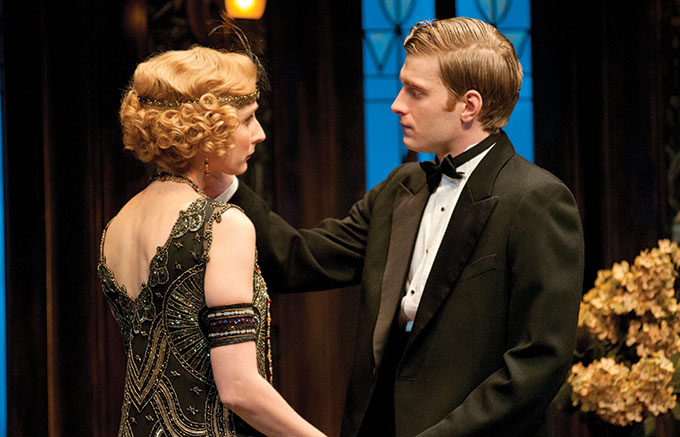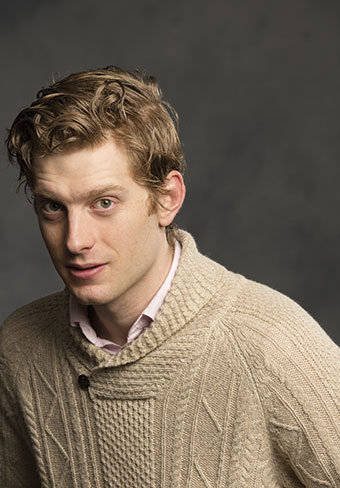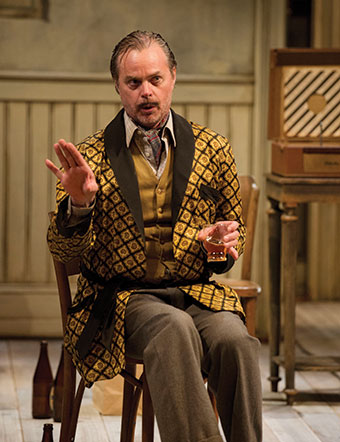Acting at the Shaw Festival: Wade Bogert-O'Brien
by Anthony Chase


Wade Bogert-O’Brien is a strawberry blond actor with soulful eyes and a handsomely innocent face who often plays characters who suffer for love. He does this ardently and beautifully, usually in English comedies that were popular in the early years of the 20th century.
Now in his fifth season as a member of the Acting Ensemble at the Shaw Festival, in 2011 Bogert-O’Brien pined for Bernard Shaw’s Candida. Last season, he yearned for a fickle-hearted girl as Kit Neilan in Terence Rattigan’s French Without Tears.
This season, in Somerset Maugham’s Our Betters, he suffers the indignity of being dumped by his hometown fiancée, who casts him aside to pursue a penniless European with an aristocratic title. This summer, while he is not being lovelorn, he’s also appearing as Charles Lomax, the shallow fiancé of the title character’s younger sister in Shaw’s masterpiece, Major Barbara.
Other Shaw Festival appearances for the graduate of the Banff/Citadel Professional Theatre Program and George Brown Theatre School include roles in Misalliance, When the Rain Stops Falling, An Ideal Husband, The Doctor’s Dilemma, Brief Encounters, and Ways of the Heart.
Bogert-O’Brien is the consummate juvenile lead: good-looking, passionate, manly yet vulnerable. And while there may be a certain similarity among the parade of heartsick young men on his resume, the actor notes that there is great variety as well.
“I was thinking about French Without Tears just today,” says the talented Canadian, sitting backstage after a matinee of Our Betters. “That play does fall into the same slot of the season as this show—you know, a comedy of that period and style that is not by Shaw. But I think it is a very different play. Maugham’s play is more naturalistic. The dilemma in French Without Tears is more farcical. Kit is so naïve and so unaware and so unobservant,” he says. “Fleming is much more observant and in tune to what is going on.”
It’s true. In Our Betters, Fleming Harvey is the equivalent of Nick Carraway, that thoughtful Midwestern American in The Great Gatsby, lost amidst the lurid shenanigans of the self-serving nouveau riche. By contrast, Kit was a wounded puppy in a cautionary fable. And in that distinction lies one of the great joys of the Shaw Festival: there is always a great deal to analyze and to discuss after seeing a play at the Shaw. This is a festival for people who adore the theater and who like to think.
Indeed, one of the great things about Buffalo, in addition to our own cultural riches, which include theaters galore, is our proximity to Ontario and the Shaw Festival in beautiful Niagara-on-the-Lake. There have been Buffalonians supporting the Shaw Festival—on its Board of Governors and in the audience—since its beginnings in the early 1960s, first as a theater dedicated to the works of George Bernard Shaw, then Shaw and his contemporaries; then with a mandate expanded in 2000 to include new plays written about the period of Shaw’s lifetime (1856-1950); and then expanded again in 2009 to include the work of “‘contemporary Shavians’—writers whose work, like Shaw’s, continues to question the status quo in new and different ways.”
The mandate is lofty and exciting, but what the patrons who go back year after year really adore is the actors in the company. To be hired as a member of that esteemed ensemble is a great distinction in any actor’s career. Bogert-O’Brien achieved the honor in 2009.
“When I came to the Shaw,” he says, “we were doing Tonight at 8:30 [a collection of ten Noël Coward one act plays]. It was only my second job out of school. I got to do all those great little parts. I got five little characters, all fully written Noël Coward roles. It was a great opportunity!”
The Shaw Festival Season
Festival Theatre
Guys and Dolls Music and lyrics by Frank Loesser
Book by Jo Swerling and Abe Burrows
Through November 3
Lady Windermere’s Fanby Oscar Wilde
Through October 19
Enchanted April by Matthew Barber, from the novel by Elizabeth Von Arnim
Through October 26
Court House Theatre
Peace in Our Time: A Comedyby John Murrell, adapted from Bernard Shaw’s Geneva
Through October 12
The Light in the PiazzaBook by Craig Lucas Music and lyrics by Adam Guettel
July 4 – October 13
Trifles (Lunchtime One-Acts) by Susan Glaspell and Eugene O’Neill
Through October 12
Royal George Theatre
Our Bettersby W. Somerset Maugham
Through October 27
Major Barbaraby Bernard Shaw
Through October 19
Faith Healerby Brian Friel
Through October 6
Studio Theatre
Arcadiaby Tom Stoppard
July 14 – September 7

From the start, Bogert-O’Brien attracted attention.
“In my second year,” he recalls, “I was Redpenny in Shaw’s Doctor’s Dilemma, and I was one of the butlers in [Oscar Wilde’s] An Ideal Husband.” Shaw describes Redpenny, the titular character’s assistant, as “a wide-open-eyed, ready, credulous, friendly, hasty youth, with his hair and clothes in reluctant transition from the untidy boy to the tidy doctor.” Bogert-O’Brien skillfully fit the bill.
Then in his third season, the actor was given one of the truly great Shavian roles.
“My third season here, I did Marchbanks in Candida,” recalls the actor simply. “That was my first big role professionally. It was great. It was scary.”
Marchbanks is a young poet in love with older Candida, the wife of a prominent minister. The young man wants to rescue his beloved from what he believes is the thankless drudgery of her marriage. This is a role that has launched careers as far ranging as those of Marlon Brando (who played the role opposite Katharine Cornell in 1946) and Bobby Steggart (a Tony nominee who will star on Broadway in The Big Fish next season).
“It was a big jump,” agrees Bogert-O’Brien, “and I am really fortunate that I got that huge opportunity. Not many people get the opportunity to become part of a company like this, and to be given such a role.”
A “big jump” is the sort of thing that the Shaw Festival can do for an actor. Butler today; Marchbanks tomorrow.
Populating the expansive Shaw Festival ensemble involves elaborate casting algebra.
“[Working at the Shaw] is a year by year arrangement, and it’s different every year,” explains Bogert-O’Brien. “We all work show by show on contracts, and when you are an actor, you never really know if the show you’re in is the last show you will ever do. Each summer, usually in July or August, we find out what the next season will be, and then we have the opportunity to go in and meet with [artistic director] Jackie [Maxwell] and talk to her about whether we want to come back and what sorts of roles we want to play. I’ve been lucky. Normally, when I’ve gone in, she’s already had an idea of what she’d like me to do. I feel really blessed to have had the opportunities I’ve had.”
For the rest of the year Bogert-O’Brien lives in Toronto. He auditions. Sometimes he does commercials.
“I want to focus on theater,” he explains, “and right now I am particularly interested in this type of theater, classical theater, and I really like Shaw. Certainly I would be interested to do a very edgy contemporary play if one came my way, and I do think it’s important to have goals and ambitions. But right now, I’m happy to be getting better and to be getting the opportunities that I have. I’m trying to build good working relationships and grow as an actor.”
Building relationships is a huge part of working in a company like the renowned Shaw Festival ensemble, and certainly part of the thrill is the chance to work with some of the great senior actors of the Canadian stage.
“It’s a great company in that way,” Bogert-O’Brien confirms. “The senior actors are very supportive of the younger actors. There are many good examples. I think of someone like Michael Ball. I’ve done four shows with Michael Ball. He was in the first two Noël Coward plays I did, he was in Doctor’s Dilemma, and last year he was in French Without Tears. I remember the first year, he was playing roles that were the same size as the roles that I was playing! It was so cool to watch him attack those roles. He is so enthusiastic, and he is so classy. There is zero hint of an ego. He accepts everything that the director offers. I’ve always found that really inspiring, because he is so good, and so revered. He is so grounded. At the same time, he is able to accept and incorporate what he sees. In that way he is able to engage with and collaborate with his colleagues, and I really admire that. I hope I will be like that one day. I hope I will have that confidence and ability.”
During his first year at the Shaw, Bogert-O’Brien also worked with the great and much adored Goldie Semple.
“She was playing three roles in Brief Encounter,” he recalls. “She was really funny and really different in each one. She was so happy and so positive. I was so young and so green, and not really a part of the social scene, so it wasn’t until mid-season that I even knew she was ill. I just knew her inspiring and affirmative presence.”
Semple died in December of that same year.
A young actor at the Shaw will work with some of the greatest classical actors in the English-speaking world. I recall when Laurence Olivier died, I was writing for Theater Week magazine in New York. The editor polled the staff, asking, “Who is the greatest living classical actor now?” I responded, “My God! Has something happened to William Hutt?” Talking to Wade Bogert-O’Brien, a remarkably talented actor with a distinctive personality and incandescent stage presence, reminded me of a litany of great Canadian stars, from Heath Lamberts to Brian Bedford, and of one particularly memorable afternoon I spent sipping martinis with the great William Hutt. Today, of course, the beverage is chamomile tea.
Does Bogert-O’Brien envision a career that will, over the decades, make him the sort of venerable and adored Shaw Festival ensemble member that he so admires?
“I feel a very strong attachment to this theater, and I feel very attached to this place,” he says thoughtfully. “I would feel very lucky to have the chance to work here throughout my career. Of course, you never know if you will have that opportunity or what other opportunities might come your way. But if that happened it would be wonderful!”
For tickets to the Shaw Festival visit www.shawfest.com, or call 1-800-511-SHAW.
|
Issue Navigation> Issue Index > v12n26 (Week of Thursday, June 27) > Acting at the Shaw Festival: Wade Bogert-O'Brien This Week's Issue • Artvoice Daily • Artvoice TV • Events Calendar • Classifieds |









 Current Issue
Current Issue